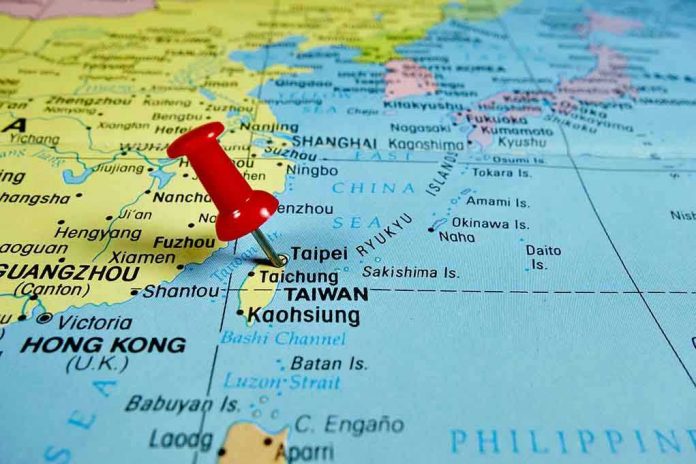
Australia’s flat-out refusal to bow to U.S. demands for pre-commitment in a Taiwan war is sending shockwaves through the so-called “alliance”—and the White House can’t hide its frustration as allies start asking if Uncle Sam has lost the plot.
At a Glance
- U.S. officials are demanding Australia and Japan guarantee military support if China moves on Taiwan, but Australia is refusing to pre-commit.
- Canberra’s government insists decisions must be made by future leaders, rejecting pressure to lock in AUKUS assets for a hypothetical war.
- The Biden-era “woke” alliance dynamics are being recalibrated as Trump’s administration seeks clear answers, not diplomatic hedging.
- Australia’s stance may reshape Indo-Pacific defense cooperation, with sovereignty and economic realities trumping U.S. demands.
Australia Pushes Back on U.S. Pressure for Taiwan War Commitments
The Trump administration, fresh off a resounding mandate to put America First, is now discovering that not every “ally” is eager to follow Washington’s marching orders into another global conflict—especially when the stakes involve China, Taiwan, and the very real threat of economic blowback. The Pentagon, led by Elbridge Colby, has been leaning hard on Australia and Japan to sign on the dotted line for a hypothetical war scenario against China over Taiwan. But Canberra isn’t buying what D.C. is selling. Instead, officials from Down Under are making it clear: no pre-commitments, no matter how many times the White House asks. The Albanese government, already feeling the sting from Beijing’s trade punishments in recent years, knows exactly what happens when you poke the dragon simply to please bureaucrats half a world away. They’re not about to hand over their military decision-making on a silver platter—not after watching the consequences of following U.S. adventurism in the Middle East.
Defence Industry Minister Pat Conroy put it plainly: Australia will not promise troops, submarines, or anything else in advance. No, they’re not about to get railroaded into a “coalition of the willing” sequel. Instead, they’re standing on sovereignty. It’s a stance that has U.S. officials wringing their hands and demanding “clarity”—as if any nation with a shred of self-respect would lock itself into a war plan before the first shot is fired. Prime Minister Anthony Albanese hasn’t budged either, refusing to say whether Australia would help the U.S. defend Taiwan. And why should he? The only thing worse than being dragged into a conflict by a superpower is being told you have no say in it at all.
AUKUS, Alliances, and the Bitter Taste of “Strategic Ambiguity”
Let’s talk about the so-called “AUKUS partnership,” the three-way defense pact that was supposed to guarantee regional security and keep the Chinese Communist Party up at night. Well, now U.S. officials are reportedly linking the delivery of nuclear-powered submarines to Australia’s willingness to pre-commit to a Taiwan war. That’s right: “You want subs? You’d better promise to use them where we say, when we say.” It’s the kind of ham-fisted leverage that makes allies rethink the whole notion of partnership. And it’s not just Australia rolling its eyes; Japan is feeling the squeeze, too, as D.C. tries to strong-arm clarity from every corner of the Indo-Pacific.
But here’s the irony—Washington itself is still playing the “strategic ambiguity” game when it comes to Taiwan. The United States refuses to say outright if it will defend Taiwan, yet expects its allies to sign unconditional checks for a war that, let’s face it, most taxpayers never asked for. You could call it hypocrisy, or you could call it business as usual for a foreign policy establishment that over-promises, under-delivers, and always finds a way to push the cost onto someone else. Remember Iraq? Afghanistan? The difference this time is, the bill might come due in the form of Chinese sanctions on Australian exporters, not just American tax dollars.
Sovereignty, Economic Reality, and the Backlash Against U.S. Overreach
The situation is a textbook example of why nations value sovereignty more than empty alliance rhetoric. For Australia, the message is simple: decisions about war and peace will be made by Australians, for Australians, at the time they need to be made. Not by some “coalition consensus” manufactured in Washington think tanks. Experts are lining up to agree—Professor Peter Dean labeled the push for locked-in commitments “ludicrous,” and analysts at the Lowy Institute warn that the tactic could backfire, weakening alliances rather than strengthening them.
Meanwhile, the economic angle looms large. Australian exporters are already bracing for what could be another round of Chinese “economic coercion” if Canberra is seen as getting too cozy with U.S. war planning. The last thing anyone wants is to lose their livelihoods over a conflict that remains hypothetical. And at home, the Albanese government is facing a public that remembers the misadventures of the past and isn’t eager to sign up for another round. If Washington keeps pressing, it could force a major rethink of what these alliances are really worth—and who they actually serve.
Sources:
Pentagon pressing Australia on potential Taiwan war role
AUKUS ultimatum: Australia over Taiwan risks backfiring in Washington
Anthony Albanese declines to say if Australia will help the US to defend Taiwan



